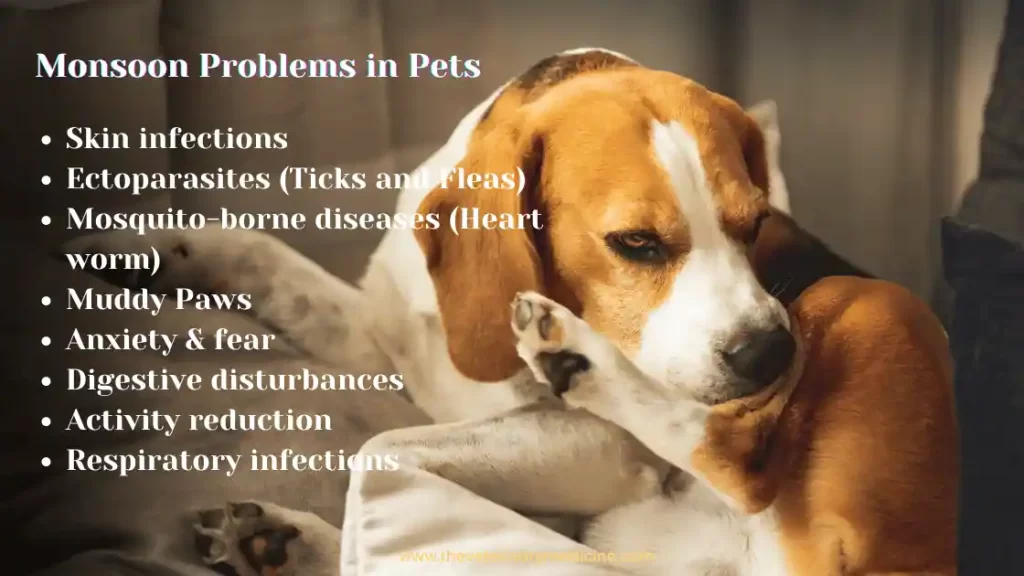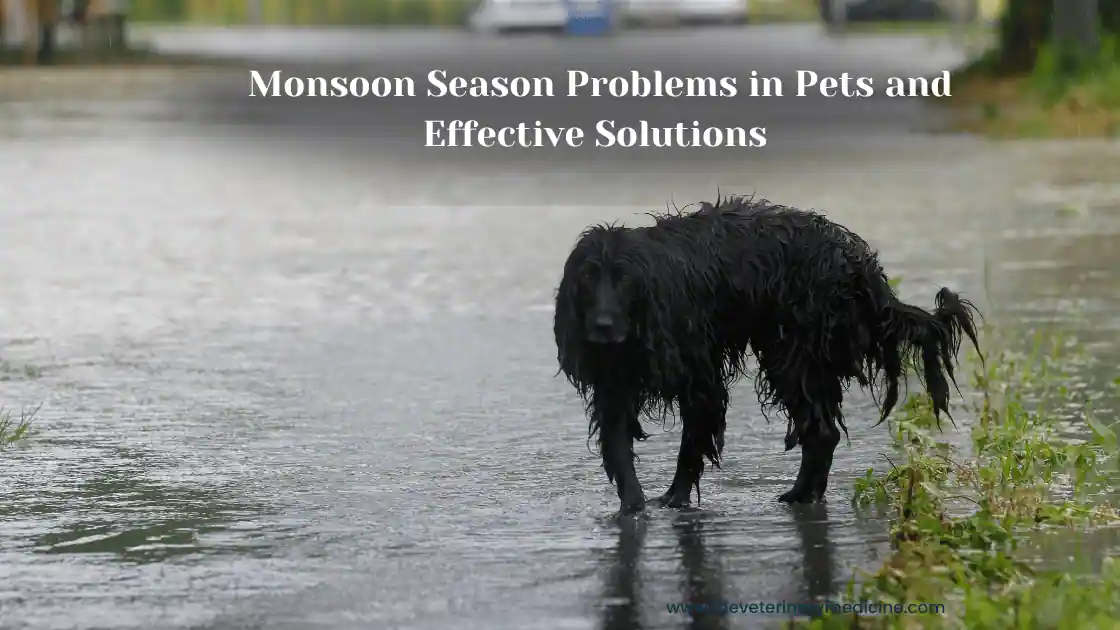Monsoon Problems in Dogs and Cats
During monsoon season, pets of all ages and breeds can face various health and behavioural problems that require proper treatment or management to ensure their health and well-being. Here are some common health issues that dogs and cats may face during the monsoon and how to manage them:
1. Skin Infections:
One of the most common problems that pets face during the monsoon is skin infections. Hot and humid conditions during monsoon can lead to fungal and bacterial infections in pets those who are susceptible, particularly on their skin. These infections can lead to common skin conditions like dermatitis, fungal infections, and hotspots. It is more common in dogs who have poor skin integrity or under stress or poor nutrition. Constant dampness also is a reason of itchy skin. Regularly check skin for any signs of infection. Keep your pet’s coat dry and clean, and consider using antifungal shampoos recommended by your veterinarian.
2. Ticks and Fleas:
The rainy season can lead to an increase in ticks and fleas’ population. These ectoparasites thrive in warm, humid conditions and infestation can cause skin irritation, discomfort and spread diseases like tick fever, Lyme disease etc. Use tick and flea preventatives as recommended by your vet and regularly groom your pet to check for any signs of infestation.
3. Mosquito-borne Diseases:
Mosquito-borne diseases like heartworm and mosquito bite allergies can pose a threat to pets during the monsoon. Ensure your pet is on a preventive medication regimen for heart worms recommended by your veterinarian and use herbal mosquito repellents.
4. Muddy Paws:
Rain can make the ground muddy, leading to dirty paws and potential infections or skin irritation leading to pododermatitis. Wipe your pet’s paws after walks and consider using pet-safe paw wipes or boots for protection.
5. Water logging:
Avoid letting your pet play in stagnant water as it can contain harmful bacteria and parasites. Keep your pet’s living area dry and clean to prevent water-borne diseases. Ensure your pet is dry and not left in wet conditions for too long. Towel dry or use a blow-dryer on a low setting if they get wet from the rain.
6. Anxiety & Fear:
Some pets may feel anxious during thunderstorms and heavy rain falls. Create a safe and comfortable space for your pet during storms and consider sound proofing, paly calming music or use calming aids or consult with a veterinarian for anxiety and fear management.
7. Digestive Disturbances:
Increased moisture can lead to growth of harmful bacteria and parasites during the season. Pets often experience digestive issues like vomiting and diarrhoea due to accidentally ingesting contaminated water or food. Ensure fresh, clean water is available and keep their feeding area clean and free from stagnant water.
8. Activity reduction:
Reduced outdoor activities can lead to a decrease in physical exercise and mental stimulation. Engage your pet in indoor play and consider short, supervised walks during lighter rain to keep them active. Invest in interactive toys like puzzle feeders or tug ropes to keep your pet mentally and physically stimulated even when indoors.
9. Respiratory Infections:
Damp and humid conditions of the monsoon can also lead to respiratory infections in pets. Dogs and cats with pre-existing conditions or weakened immune systems are particularly at risk. Such pets start showing symptoms like coughing, sneezing, nasal discharge, and difficulty in breathing more frequently as the monsoon season progresses. These infections can be treated with antibiotics and supportive medicines.
10. Vaccinations:
Ensure your pet’s vaccinations are up to date, as the monsoon season can increase the risk of certain diseases like Lyme disease, Leptospirosis etc.
Keep a pet first aid kit ready and ensure all emergency contacts (vet, pet hospital) are easily accessible.

Home Care Tips & Management Strategies for Monsson Pet Care
Common problems faced by pets during the monsoon can be managed easily through some effective management strategies.
1. Maintain Hygiene
Keeping your pet clean and dry is important during the monsoon. Regular baths with antifungal and antibacterial shampoos can help prevent skin infections if your pet is susceptible for skin infections. Make sure to dry your pet thoroughly after a bath or if they get wet in the rain. Pay special attention to areas like the ears, paws, and underbelly, where moisture can accumulate.
2. Regular Grooming
Grooming your pet regularly can help prevent tick and flea infestations. Brush their fur to remove loose hair and check for any signs of parasites and infection. Regular brushing helps remove dead skin cells and prevents matting, which can trap moisture. After walks in wet areas, thoroughly check your pet’s fur for ticks, especially around the ears, neck, and paws. Consider using tick and flea preventive treatments recommended by your vet.
3. Safe Drinking Water
Ensure that your pets have access to clean, fresh drinking water at all times. Avoid letting them drink from puddles or other stagnant water sources. This can help in prevention of gastrointestinal infections.
4. Monitor Diet
Maintain a consistent feeding schedule and avoid sudden changes in their diet. Adjust your pet’s diet to ensure they are getting the necessary nutrients to boost their immune system. Avoid giving them leftover food or treats that might have been contaminated by moisture and bacteria. Opt for smaller, more frequent meals during the monsoon. Easily digestible options like freshly boiled chicken and rice can be helpful. Consult your vet for any specific dietary recommendations.
5. Create a Dry Living Environment
Ensure your pet’s living area is dry and well-ventilated. Use dehumidifiers if necessary to reduce humidity levels. Regularly clean / wash and disinfect their bedding and surroundings to prevent the growth of mold and bacteria. After walks, use a clean, absorbent towel to dry your pet thoroughly. Pay special attention to areas between the toes, under the ears, and skin folds.
6. Limit Outdoor Activities
Physical health is paramount, the monsoon blues can also affect your pet’s mental well-being. While exercise is important, limit your pet’s outdoor activities during heavy rains. Reduced outdoor playtime due to rain can lead to boredom and anxiety. Opt for indoor playtime and activities to keep them entertained and physically active. Engage your pet in indoor games and activities like fetch, hide-and-seek, or puzzle toys. Make sure your pet gets enough cuddle time and attention to combat feelings of loneliness. Provide chew toys and food puzzles to keep their minds active.
Some pets get anxious during thunderstorms. Create a safe haven for them, like a covered crate or a quiet room, and play calming music to mask the noise or use vet recommended calming supplements or medicines if your pet feels anxious even after these efforts. If you must take them outside, use raincoats and paw protectors to keep them dry.
7. Regular Vet Check-ups
Schedule regular check-ups with your vet during the monsoon season. Seasonal skin infections, ectoparasites, respiratory infections, early detection of any health issues can lead to more effective treatment, management and can prevent more serious complications. Your vet can also recommend preventive measures and treatments tailored to your pet’s specific needs.
Always keep a pet first aid kit ready and list of emergency contact or nearby emergency vet care facilities.
Conclusion:
Monsoon season can bring significant challenges for pets, from health issues like skin infections and parasitic attacks to behavioral changes such as anxiety and reduced activity. By understanding monsoon problems and implementing the solutions such as maintaining hygiene, providing safe indoor activities, and preparing for emergencies, you can ensure your pet stays healthy and happy during the rainy season. Remember to consult with your veterinarian for specific advice on managing your pet’s health during the monsoon season.





